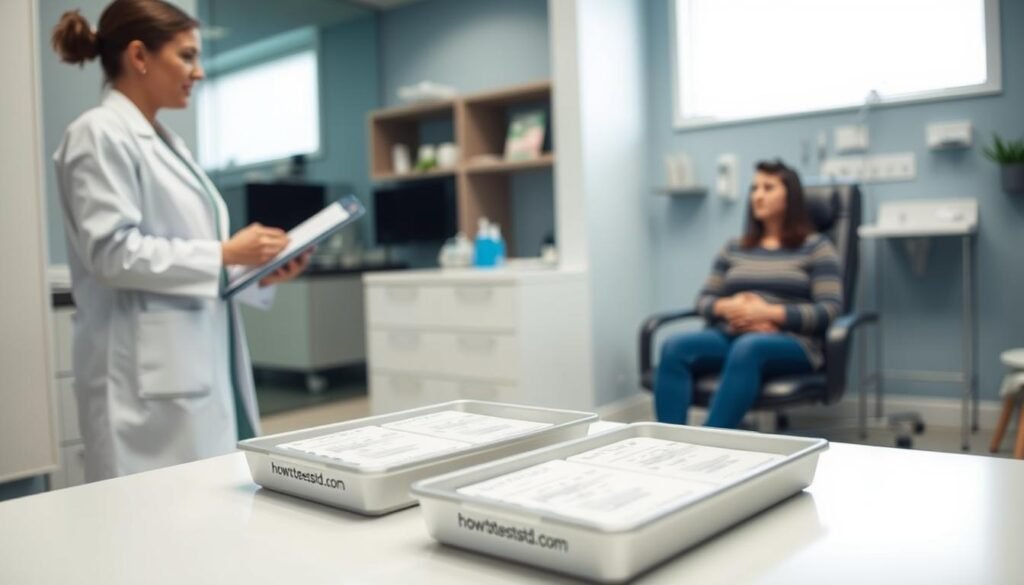Discreet STI Testing: Prioritize Your Wellbeing
Did you know that cases of syphilis, chlamydia, and gonorrhea have been on the rise in Canada? This is a big worry. It shows how important it is to take care of your sexual health.
Anonymous STI testing is a private way to find out about your health. It’s key to be ahead of your health. With discreet testing, you can look after your health without stress.
Choosing discreet STI checks is a big step for your health. It’s time to take charge of your sexual health.
Key Takeaways
- STI cases are rising; it’s vital to stay informed.
- Anonymous testing gives you a private way to check your health.
- Don’t wait; make your health a priority with discreet testing.
- Discreet STI testing is a stress-free way to get tested.
- Being proactive about your health can greatly improve your wellbeing.
The Critical Importance of STI Testing
Getting tested for STIs is very important. It’s something everyone who has sex should do. STIs can hurt your body, mind, and relationships.
The Rising Prevalence of STIs in the United States
More and more people in the U.S. are getting STIs. Chlamydia, gonorrhea, and syphilis are common ones. They are rising in many groups. This shows we need to test for STIs often.
Why Regular Testing Matters for Your Health
Testing for STIs is key because many don’t show symptoms. If not treated, STIs can cause big problems. They can even make you infertile or raise your HIV risk. Testing early can stop these issues.
Breaking the Stigma Around Sexual Health
Even though we talk more about sex, there’s a stigma around STIs. We need to make talking about STD screening normal. This way, more people will get tested. It helps us all stay healthy.
Being proactive about your health is important. Don’t wait to get tested. Anyone who has sex can get an STI. Regular testing keeps you healthy.
Common STIs and Their Symptoms
Knowing about common STIs and their signs is key for good sexual health. Sexually transmitted infections are a big health worry. Knowing the signs helps people get medical help fast.
Bacterial STIs: Chlamydia, Gonorrhea, and Syphilis
Bacterial STIs like chlamydia, gonorrhea, and syphilis are treated with antibiotics. Chlamydia is very common and often has no symptoms. This is why getting tested often is so important.
Gonorrhea can cause pain when you pee and discharge. Syphilis starts with a sore that doesn’t hurt. If not treated, these infections can cause big health problems.
Viral STIs: HIV, Herpes, and HPV
Viral STIs like HIV, herpes, and HPV can’t be cured but symptoms can be managed. HIV weakens the immune system and can lead to AIDS if not treated. Herpes causes sores, and HPV can cause warts and some cancers. It’s important to know about these risks and symptoms.
Asymptomatic Infections: When Symptoms May Not Be Present
Many STIs, both bacterial and viral, don’t show symptoms. This is why regular testing is so important. People might unknowingly spread infections. Getting tested at STI clinics or with healthcare providers is key.
It’s very important to take care of your health. Don’t delay getting tested. Regular testing is a big part of keeping your sexual health safe and stopping STIs from spreading.
Types of STI Checks and Testing Methods
Knowing about STI checks is key for your health. There are many tests, like blood, urine, and swab tests. Each finds different infections.
Blood Tests and What They Detect
Blood tests find STIs like HIV, syphilis, and hepatitis. They look for antibodies or antigens in your blood. These tests are done in a doctor’s office.
HIV tests look for HIV antibodies. Syphilis tests find antibodies against the syphilis bacterium. These tests are usually very accurate.
Urine Tests and Swab Tests
Urine tests find chlamydia and gonorrhea. They look for bacteria in your urine. Swab tests take a sample from places like the cervix or throat.
Urine and swab tests are easy and accurate. The choice depends on what you think you might have and what you prefer.
Rapid Tests vs. Laboratory Tests
STI tests are either rapid or laboratory tests. Rapid tests give quick results, in minutes. Laboratory tests take longer but are more accurate.
| Test Type | Result Time | Accuracy |
|---|---|---|
| Rapid Tests | Minutes | High |
| Laboratory Tests | Days/Weeks | Very High |
Health experts say, “Testing regularly is key for your health and stopping STIs.” Knowing about tests makes it easier.
Don’t wait to get tested. There are many tests, like blood, urine, and swab tests. Pick what’s best for you.
When to Get an STI Check: Timing Your Testing
Deciding when to get tested for STIs depends on your sexual activity and risk. Confidential STI testing is for those who value their privacy.
Recommended Testing Frequency for Different Risk Groups
How often you should get tested varies based on your risk. If you have many partners or don’t use protection, test every 3-6 months. This is because you’re at higher risk.
| Risk Group | Recommended Testing Frequency |
|---|---|
| Low Risk | Annually |
| Moderate Risk | Every 6-12 months |
| High Risk | Every 3-6 months |
Testing After Unprotected Sex or Exposure
After unprotected sex or exposure, test as soon as you can. The window period for STIs is usually 3-4 weeks. Testing during this time is key.
Signs That Indicate You Should Get Tested Immediately
Some symptoms mean you should test right away. These include unusual discharge, pain when you pee, or sores on your genitals. If you notice these, get confidential STI testing fast.
Being proactive about your health is important. Don’t wait to get tested. Regular STI checks help keep you healthy. Knowing when to test is key.
Where to Get Tested for STIs
Knowing where to get tested for STIs is key to your sexual health. There are many testing options. Pick what works best for you.
Healthcare Provider Options: Primary Care vs. Specialists
Healthcare providers are a top choice for STI tests. You can see a primary care doctor or a specialist. Primary care doctors handle general health and STI tests.
Specialists like OB-GYNs or urologists focus on sexual health. Same-day STI testing is common at these places. This means you can get tested quickly.
Public Health Clinics and Community Centers
Public health clinics and community centers are also great for STI tests. They offer STI check services at low or no cost. This makes them open to more people.
They also provide counseling and treatment. The privacy at these places is a big plus for many.
At-Home Testing Kits: Convenience and Privacy
At-home testing kits are perfect for those who like privacy. You collect a sample at home. Then, it’s sent to a lab for testing.
Results come online, and you can talk to doctors for advice. These kits are great for those who don’t like clinics or want ease.
Being proactive about your health is very important. Don’t delay getting tested. There are many ways to get tested, like clinics, doctors, or at-home kits.
By choosing to get tested, you’re taking a big step for your health. It’s all about keeping yourself and others safe.
The STI Testing Process: What to Expect
Knowing about STI testing helps reduce worry. It’s key to be ahead of your health. Don’t delay getting tested.
Getting ready for your STI test can make it less scary. Here are some tips to help you prepare:
Before Your Appointment: Preparation Tips
- Bring a list of any medications you’re currently taking.
- Be ready to talk about your sexual history with your healthcare provider.
- Remember, your privacy is a top concern in STI testing.
During the Test: Step-by-Step Walkthrough
The STI testing process is pretty simple. Here’s what you can expect:
- A healthcare professional will talk about your medical and sexual history with you.
- You might get a physical check-up, depending on the test.
- Blood, urine, or swab samples will be taken for testing.

After Testing: Timeline for Results
How long it takes to get your STI test results varies. Some quick tests can show results in 20-30 minutes. Others might take a few days or a week.
| Test Type | Typical Turnaround Time |
|---|---|
| Rapid STI Tests | 20-30 minutes |
| Laboratory Tests | Several days to a week |
Being proactive about your health is very important. Don’t wait to get tested if you think you might have been exposed to an STI.
“The most important thing is to take control of your sexual health. Getting tested is a responsible and proactive step towards maintaining your wellbeing.”
Confidential and Discreet STI Testing Options
When it comes to STI testing, keeping things private is key. People looking for STD screening want to know their info stays safe. Laws help keep your health info private.
Understanding Patient Confidentiality Laws
Laws like HIPAA in the U.S. protect your health info. These rules help keep your STI test results safe. They make sure only you can see your health records.
Anonymous Testing Services
Some tests let you stay anonymous. You can get tested without anyone knowing it’s you. It’s good to know where to find these services, as they vary.
| Testing Service | Confidentiality Level | Anonymous Option |
|---|---|---|
| Public Health Clinics | High | Yes |
| Private Laboratories | High | No |
| At-Home Testing Kits | High | Yes |
Digital Privacy and Online Test Results
Online tests raise privacy concerns. But, good services use safe ways to keep your info private. Always pick online STD screening that cares about your digital safety.
Discussing Testing with Partners
Talking about STI tests with your partner is important. It helps keep everyone healthy. It’s a way to make sure you both are safe and tested.
Looking after your health is important. Don’t wait to get tested. There are many ways to test for STIs privately. This way, you can keep your health safe while keeping your info private.
Navigating Costs and Insurance for STI Screening
Understanding the costs of STI screening is key to your sexual health. The price of STI tests changes based on the test type, healthcare provider, and insurance.
Insurance Coverage for STI Tests
Many insurance plans cover STI testing. This includes preventive services thanks to the Affordable Care Act. It’s important to talk to your insurance to know what’s covered and what you might pay for.
- Check if your plan covers STI testing as a preventive service.
- Understand any out-of-pocket costs, such as copays or deductibles.
- Verify if you need a referral from a primary care physician to get tested.
Free and Low-Cost Testing Resources
If you don’t have insurance or can’t afford it, there are options. Community health clinics and public health departments offer free or low-cost STI testing. Look online for “STI testing near me” or “STI clinics” to find a place near you.

Understanding Bills and Explanation of Benefits
After testing, you might get a bill or an Explanation of Benefits (EOB) from your insurance. It’s important to understand these to avoid being overcharged. Look for details on services, costs, and insurance payments.
- Review the services listed to ensure they match the testing you received.
- Check the billed amount and any amount paid by insurance.
- Contact your healthcare provider or insurance company if you have questions or discrepancies.
Being proactive about your health means understanding and managing STI screening costs. Don’t delay getting tested. Use the resources available to you.
Conclusion: Taking Control of Your Sexual Health
Getting tested for STIs often is key to staying healthy. With cheap STI tests, you can find and treat problems early.
Private STI testing services let you check in secret. There are many ways to test, so you can pick what works best for you.
By testing often, you’re taking care of your health. Discreet testing helps keep your info safe, supporting your choice.
FAQ
What is an STI check, and why is it important?
An STI check is a test for sexually transmitted infections. It’s key for keeping your sex life healthy. Many STIs don’t show symptoms, so testing early is important.
How often should I get tested for STIs?
How often you need STI tests depends on your sex life. If you’re active, get tested yearly. More partners or no protection means more tests.
What are the different types of STI tests available?
There are many STI tests. Blood tests find HIV and syphilis. Urine and swab tests find chlamydia and gonorrhea.
Can I get tested for STIs at home?
Yes, you can use at-home kits for some STIs. But, always see a doctor to confirm and treat if needed.
Are STI test results confidential?
Yes, your STI test results are private. Laws protect your info. Some places even offer secret testing.
How long does it take to receive STI test results?
Results time varies. Quick tests give answers fast. Lab tests take longer.
Will my insurance cover the cost of STI testing?
Many insurances pay for STI tests. Check with your provider to know what you’ll pay.
What should I do if I test positive for an STI?
If you test positive, see a doctor right away. They’ll help you get treated. Tell your partners to get tested too.
Can I get tested for STIs at a public health clinic?
Yes, public clinics offer STI tests. They might be free or cheap. These clinics help keep your health private and affordable.
How can I discuss STI testing with my partner?
Talking about STI tests with your partner is tough. But it’s vital for your health. Be open and stress the need for both of you to test.


